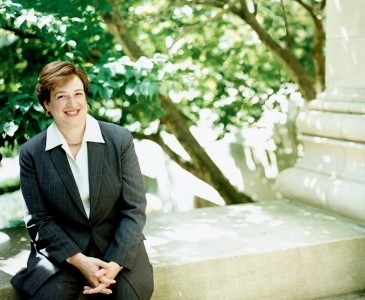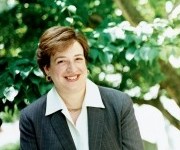 Elena Kagan — a great role model for young women, and a GINK too. Read up on her environmental record.Pundits have seized on the fact that our newest Supreme Court justice, Elena Kagan, has no kids.
Elena Kagan — a great role model for young women, and a GINK too. Read up on her environmental record.Pundits have seized on the fact that our newest Supreme Court justice, Elena Kagan, has no kids.
As David Leonhardt notes in a recent New York Times article, “The last three men nominated to the Supreme Court have all been married and, among them, have seven children. The last three women — Elena Kagan, Sonia Sotomayor, and Harriet Miers (who withdrew) — have all been single and without children.” Leonhardt goes on to discuss how women who take time off from the traditional career path to care for children rarely regain the momentum they lose, meaning that childfree women tend to advance further in their careers.
I’m glad Obama chose a woman for the slot, and I’m glad the occasion is spurring a conversation about the challenges women still face in the world of work. Mothers shouldn’t have to pay any more of a career price than fathers do.
But while Obama’s pick signifies continued progress in the fight for women’s equality, the discussion surrounding that pick shows how much prejudice still exists toward another group: the childfree.
In a post written before Obama named Kagan as his nominee, Peter Beinart argued in The Daily Beast that the president should choose a mother. “[I]t’s important not just to have lots of women in positions of political power, but to have lots of women with kids,” he wrote, arguing that girls and young women need to see female role models who are both mothers and high achievers.
When Kagan was nominated, a “feminist friend” of New York Times writer Lisa Belkin said, “I wish she were a mother. This sends the wrong message.”
In a piece in The Washington Post entitled “The Supreme Court needs more mothers,” Ann Gerhart wrote, “Motherhood offers a one-word verifier. It signals a woman with an intensity of life experiences, jammed with joys and fears, unpredictability and intimacy, all outside the workplace.”
Hilary Shenfeld at iVillage took this thread further still, arguing that a nominee who’s a mother would have brought “some unique ‘mom-spertise’ to the Supreme Court”:
With the addition of … a jurist with a mama bear lurking inside, the Supreme Court would have a member who’s lived through the toughest job on earth and came out better for it. She’s wiped away dirt and tears, helped with homework and heartache, made as many decisions as dinners, really listened and really heard. She’s had years of experience settling squabbles and determining who’s right and who’s wrong. She would have come to the job not only with legal smarts, but also the real-world wisdom picked up from the day-in, day-out joys, frustrations, and plain hard work of being a mother and raising a family.
Men don’t get nearly this kind of scrutiny over their personal and family choices. Still, a childfree man can be suspicious too. Take David Souter, whose nomination to the Supreme Court in 1990 gave Sen. Orrin Hatch (R-Utah) the heebie-jeebies. “It concerns me that the court is facing a whole range of family issues and that Judge Souter does not have the experience of family life — a wife and children — to draw on to help him with these decisions,” Hatch told NPR. “I’ll be exploring that because, frankly, right now it makes me uncomfortable.”
Personally, I’m more wigged out by the fact that Antonin Scalia has nine children.
I get that parenthood can inspire new perspectives and skills, but so can a childfree life. Either choice brings trade-offs. Either can be “jammed with joys and fears, unpredictability and intimacy.” Either can bring “real-world wisdom.” I’m not sure why “feminists” are parroting Sarah Palin’s Mama Grizzly pablum, but the feminism I want to be part of embraces and sticks up for all women, including the nearly 20 percent of us who don’t have children, whether by choice or circumstance. How heavily populated will the world have to be before we get over the notion that childless people should be viewed with either pity or suspicion?
D.C. chatterers automatically assume that it was a sacrifice for Kagan not to have kids. Maybe so. Or maybe not. Maybe Kagan simply didn’t want children and decided to fill her life with other experiences. Maybe she freely chose her goals, pursued them with diligence and intelligence, and has met with fantastic success. To me that sounds like exactly the “right message” for the nation’s young women.
—–
Read more about population and the childfree option:
- The GINK manifesto: Say it loud: I’m childfree and I’m proud
- Childfree messages in Sex and the City 2 and Eat, Pray, Love
- How green are the ‘childless by choice’?
- Women’s rights are the right way to approach the population issue
- Nearly a fifth of American women skip childbearing
- Want to join the Voluntary Human Extinction Movement?
- And still more about population



